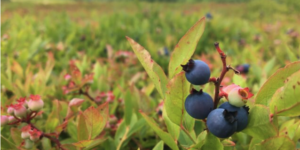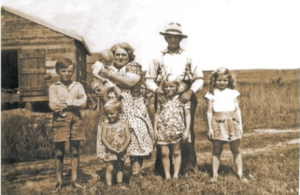Wicked Wild’s farm is typical of many small to midsized Maine wild blueberry farms. Uneven terrain and boulders have historically required hand raking which is labor intensive. The general practice for these farms is to burn the fields in the early spring by laying straw harvested from the farm on the fields. This practice changed in the 1960’s to burning with oil, which was expensive and released smoke and pollutants into the atmosphere. Half of the acreage was burned each year and half of the acreage was harvested. A robust local wild bee population dependably pollinated the blossoms, a critical step for the flowers to become berries. The farmers counted on regional rainfall alone to provide adequate water for the crop.
rainfall alone to provide adequate water for the crop.
Family, friends and seasonal workers hand raked the blueberries during harvest. The berries were pre-cleaned in the field with a winnower, which removed a large percentage of sticks, rocks and leaves, and then poured into wooden boxes. Each raker’s berry boxes were tallied in the field, and the rakers were paid at the end of each week based on the number of boxes raked. At the end of each day, boxes of berries were hauled in from the fields and trucked to be sold to the local co-op.
The Wicked Wild blueberry fields were originally purchased by Willard A. Rice from Samuel Marston on January 19th, 1917. The farm ownership transferred from Willard to his son, Albion R. Rice, on June 3, 1933. Willard continued to work the farm until the 1950s. The wild blueberry fields have been a touchpoint for the entire family throughout their lives. Great-grandparents, grandparents, parents, aunts and uncles have always been proud of their fields and their contribution to Washington County’s economy. In 2021, generational succession, competition and a global pandemic combined to create a fork in the road for the century-old Rice farm. Family members formed Wicked Wild, LLC in 2021 to implement necessary changes to allow the farm to operate profitably and assure its long-term viability.
Wild blueberry pricing is dictated by the large growers/processors who have an economic advantage of scale. Not right or wrong – just what has happened to the Maine industry over the past 50 years. It is no longer economically feasible to grow blueberries for sale to processors and co-ops – it is not financially sustainable. For the small farms to survive, there must be products that allow a higher margin. It is not reasonable to assume the next generation will take over farm operations that are not profitable which has driven the Rice family to explore all available options for increasing margins and introducing value added products.
Fresh packed blueberries are more profitable than freezing, but the remote location and low population density of Washington County requires berries to be shipped while fresh or frozen. Wicked Wild applied for a Federal USDA SBIR grant to explore options for a healthy value added product to make logistics more manageable and increase the shelf life of the product. Testing is underway showing initial positive results.
“MTI’s support was a critical piece of Wicked Wild being successful in obtaining our USDA SBIR grant by providing grant writing assistance and helping with an equipment purchase needed to produce our product at the UMaine food lab. We look forward to continued collaboration and support from MTI in moving this project to Phase II commercialization. This type of work is critical to small farms and could not be accomplished without the encouragement and support of state agencies such as MTI.” – Stephen Rice, Manager of Wicked Wild, LLC.

